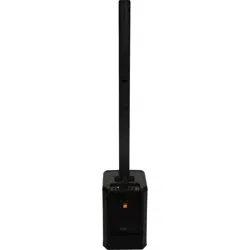Loading ...
Loading ...
Loading ...

20
. Room Medium Bright
. Room Large
. Hall Medium
. Hall Medium Bright
. Hall Large
iv. The combination of “Size” and “Pre-delay Time” dene the reverb simulation in just two controls;
how big the room is (Size) and how far away the audience member feels they are in regard to the
performers.
. Size adjusts the theoretical size of the simulated room in short, medium, long or longer.
. Pre-delay simulates the ratio of time from the source signal to the listener to the delay of the
rst reection off the closest wall.
. A shorter pre-delay time will make the audience feel farther away from the source
. A longer pre-delay time will make the audience feel closer to the source.
v. The High Frequency parameter simulates how much high-frequency reections are in the reverb.
. Simulating the sound of a room with many metal or glass surfaces is an example of a scenario
with more high-frequency reections.
. Simulating the sound of a room with soft word or outdoor settings would be an example of less
high-frequency reections.
vi. The Low frequency parameter simulates the amount of bass building in the reverb.
. An indoor, hard surface room will accumulate more bass build-up.
. An outdoor simulation would generate less bass build-up.
vii. The Level to Mix Parameter is the amount of wet signal (or signal with reverb) that is sent back to
your main mix.
. Increasing the level to mix will create a more prominent reverb effect.
. Decreasing the level to mix will create a more subtle reverb effect.
viii. To adjust any parameter, navigate to the parameter using the MASTER/MENU knob. Press the
MASTER/MENU knob to access.
. Adjust the values by turning the knob CLOCKWISE or COUNTER-CLOCKWISE.
. Press the MASTER/MENU knob to accept these changes. Press the BACK button to cancel
these changes.
c. Delay - The FX Processing Delay is designed to be a musically oriented delay, commonly used on rock and
ballad vocals and guitars. It is often set to match the specic “Beats Per Minute” (i.e. “BPM) of the song
currently being performed, plus how many delay returns are desired per beat, how long the delay keeps
returning and if the delay feeds back again multiple times.
i. “On/Off” When set to off, the Delay input is disabled. This allows the current signal to “ring out” until
the current delay signal is completed. To end the delay immediately, turn down the Delay Level to Mix
fader.
Loading ...
Loading ...
Loading ...
